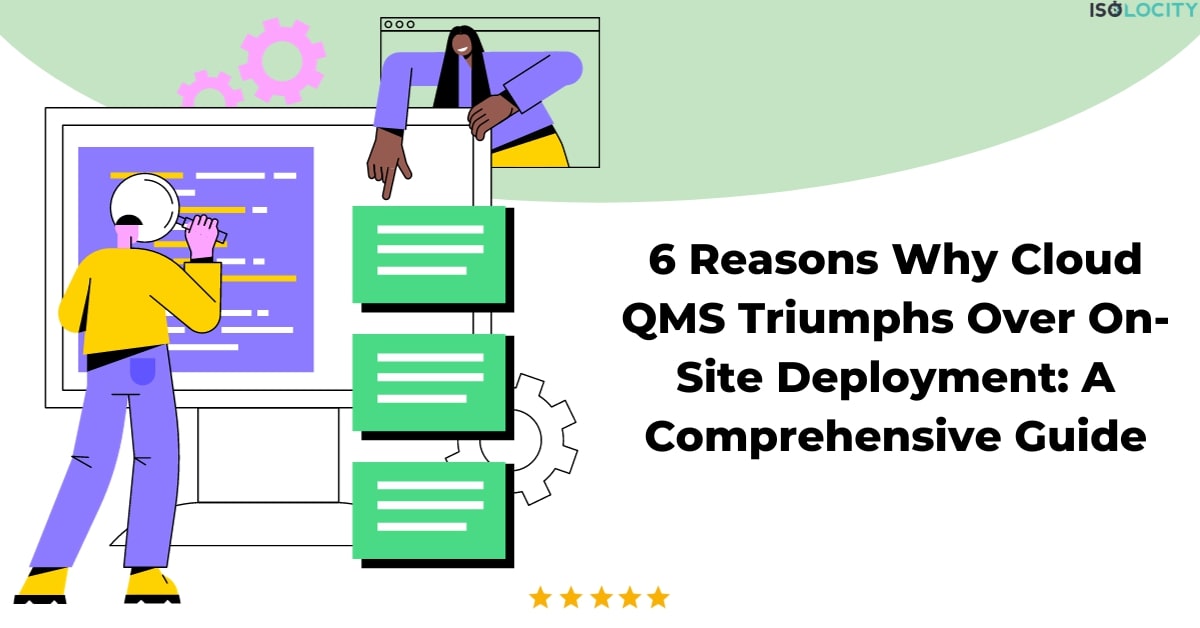Every month, we engage with numerous prospects, and a recurring question we encounter is whether we offer on-site deployment or have an on-premise solution. Interestingly, we don’t, and in this blog, we will elucidate the reasons behind our decision.
Observing the prevailing trend, businesses across the spectrum are swiftly transitioning to cloud solutions. Today, the majority of the software and solutions utilized are cloud-based. This is a shift so seamless that it has become second nature. The Software as a Service (SaaS) market is flourishing, exhibiting a remarkable Compound Annual Growth Rate (CAGR) of nearly 14%. However, let’s delve deeper into the underlying reasons driving these outcomes. While our expertise lies in quality management, the principles we discuss apply broadly to various software categories. Let’s delve into the specifics.
Not Fond of Reading? Watch The Video Here!
1. Enhanced Accessibility and Flexibility
- Cloud-based QMS: Unmatched flexibility enables seamless collaboration from any location with an internet connection, fostering real-time decision-making and global accessibility. So if you are a business that has multiple sites, you will really enjoy the cloud-based QMS. On top of that, you don’t have to always rely on your computer. If you are on the go, just open the software on your mobile device, and ta-da, all the details are there too.
- On-site Deployment: Collaboration confined to physical premises hampers real-time communication and decision-making, limiting global accessibility and hindering productivity.
2. Economic Efficiency and Scalability
- Cloud-based QMS: Operates on a subscription-based model, eliminating substantial upfront costs and allowing businesses to invest efficiently in areas driving growth and innovation. If you check our pricing page, you will know that you can get started for as little as $199 per month. As you scale up, it gets more affordable.
- On-site Deployment: Demands significant initial investments in hardware and software licenses, restricting scalability and adaptability to changing business needs. In most cases, you will need $20K just to get started.
3. Maintenance and Security
- Cloud-based QMS: Providers handle maintenance, ensuring continuous operations, minimizing downtime, implementing advanced security protocols, and safeguarding sensitive data. So, for example, if you start with Isolocity, it is our responsibility to make sure the software is up and running. In fact, we promise an uptime of 99.99%. If you still come across an issue, our customer service team is always there to help you. At Isolocity, most of the complaints get solved within 2 hours.
- On-site Deployment: Internal IT resources required for maintenance may lead to downtime, compromising security measures, and leaving the organization vulnerable to cyber threats.
4. Integration and Collaboration
- Cloud-based QMS: Seamlessly integrates with various applications, streamlining workflows and fostering efficient collaboration among teams. Embracing innovation without integration challenges. Isolocity also provides an open API, and with that, any integration is possible under the sky.
- On-site Deployment: Extensive customization may be necessary, causing delays in integration and hindering efficient collaboration, limiting productivity.
5. Regulatory Compliance and Data Protection
- Cloud-based QMS: Providers ensure compliance with industry regulations, reducing the administrative burden, implementing robust data protection measures, and safeguarding sensitive information. Isolocity is 3rd-party GMP-validated, ISO 9001-compliant software. So if you follow the basic workflow of the software, the software by default will take care of all the compliances.
- On-site Deployment: Places the responsibility of understanding and adhering to complex regulatory frameworks solely on the organization, increasing the risk of non-compliance and potential legal issues.
6. Disaster Recovery and Business Continuity
- Cloud-based QMS: Boasts robust disaster recovery features, minimizing downtime, ensuring uninterrupted services during emergencies, and significantly reducing data loss risks. So let’s say if you use Isolocity and you delete your data by mistake, we can still recover that for you without extra charges.
- On-site Deployment: Limited disaster recovery capabilities leave businesses vulnerable to data loss and operational disruptions, risking valuable resources and customer trust.
Conclusion: Embracing the Future with Cloud-Based QMS
In the post-Covid era, where remote work has become the norm for many, embracing cloud solutions has become not just a choice, but a necessity. Cloud technology offers unparalleled efficiency, effectiveness, and limitless possibilities. If data security is a concern, we encourage you to reach out to us. We can demonstrate how we ensure comprehensive data security.
Furthermore, the global trend is unmistakably shifting towards cloud solutions. Aligning your business with this trajectory is not just practical but also strategic. Embracing the cloud is akin to riding the wave of progress, ensuring your organization stays ahead in the evolving digital landscape.




